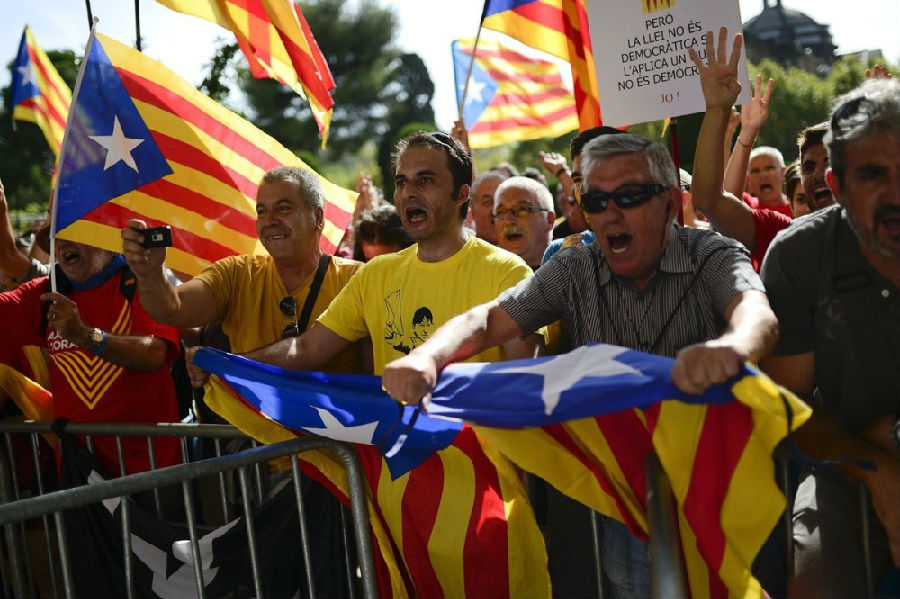Leaders Centrifugal Spain
先驱 沙盘上的西班牙
Umbrage in Catalonia
阴云笼罩卡泰罗尼亚
Even though the spectre of secession is an unwelcome distraction, Spain still needs to change
分裂的阴影分散了西班牙的注意力,尽管不受欢迎,但这个国家依旧需要变革
George Orwell, a British writer, fought in the trenches in the Spanish civil war to defend Catalonia from General Franco. He would surely be saddened by what is going on in that beautiful, cultured corner of Spain. On November 25th Catalans will vote in a regional election called as an unofficial referendum on independence. Since Catalonia represents a big chunk of the euro zone’s fourth-largest economy, and since Spain is in the front-line of efforts to save the euro, the vote and its aftermath will be felt farther afield.
英国作家乔治·奥威尔曾经参加过西班牙内战,保卫过卡泰罗尼亚,抵御了佛朗哥将军的部队。如果他还在世,定会为在这个美丽文明的西班牙东北角上演的悲剧而痛心。11月25日卡泰罗尼亚人将进行地区性选举,也作非正式独立公投。由于卡泰罗尼亚是欧元区第四大经济体西班牙的重要一部分,且西班牙又处在拯救欧元行动的前线,无疑这次投票及其结果都将产生及其深远的影响。

What could be wrong with 7.5m people with their own language and culture choosing to become a nation-state? At first blush, it is hard to object to what Catalan nationalists call the “right to decide”. In fact, there are many reasons why Catalans should not waste their energy trying to break away from Spain. Start by recalling Orwell’s definition of nationalism as “power-hunger tempered by self-deception”。
卡泰罗尼亚拥有750万人口和属于自己的语言,选择独立何错之有?乍一看,似乎很难反驳卡泰罗尼亚民族主义者所谓的“自主决定权”。事实上,有很多理由解释了为什么卡泰罗尼亚不应该在争取独立这件事上耗费精力。首先回顾一下奥威尔对于名族主义的定义:“一种因自欺而产生的权利饥渴”。
Under Spain’s constitution of 1978, Catalonia enjoys more self-government than almost any other corner of Europe. It runs its own schools, hospitals, police, prisons and cultural institutions. It lacks only tax-raising powers and the Ruritanian trappings of statehood, which nationalist politicians appear to be hungry for. As for the self-deception, this is sometimes farcical: Catalan public television offers a weather forecast that includes provinces that have been part of France since 1659, but no meteorological information for Zaragoza or Madrid. And most Catalans still seem happy to be both Catalans and Spaniards. Support for independence has risen mainly because Catalans think it would offer relief from recession.
依照西班牙1978年的宪法,卡泰罗尼亚享有比欧洲其他地区更多的自治权,拥有自己的学校、医院、警察、监狱和文化机构,但唯独没有征税的权利和理想王国的标志,即被承认的国家地位。而后两者正是名族主义者所觊觎的。谈到自欺,有时很可笑:卡泰罗尼亚公共电视的天气预报会播放早在1695年就隶属法国的一些行省的天气预报,却不播报萨拉戈萨或马德里的气象信息。而且卡泰罗尼亚人似乎很满意自己既属于卡泰罗尼亚又属于西班牙。他们支持独立主要是因为他们觉得这样能减轻经济衰退带来的痛苦。
It would not. An independent Catalonia would have more fiscal revenues, but it would also have a higher debt burden than Spain. The argument that Catalans should not subsidise feckless Andalusians is a dangerous one: apply that more widely and the euro zone would fall apart. Indeed, far from welcoming Catalonia as an independent member, the euro zone’s leaders hardly yearn for an extra nation-state.
然而事实并非真如他们所想。如果独立,泰罗尼亚人民将上缴更多的税,而且承受的债务压力要比没有独立时还大。有人认为安达鲁西亚人软弱无用,卡泰罗尼亚不应对其进行补助,但这一论调很危险:若广泛采纳,每个国家都这么想,欧元区将分崩离析。诚然,欧元区领导人一点也不支持卡泰罗尼亚独立,不希望多出一个国家来。
Spilling the Spanish beans
道破天机
All that said, the Catalan problem cannot be wished away. Roughly three-quarters of the next Catalan parliament is likely to vote for the right to decide. The constitution says only the Spanish parliament can approve a referendum—and it will not do so. The constitution has in general served both Spain and Catalonia well—but there is a case for updating it.
说归说,但卡泰罗尼亚问题不是想结束就能结束的。下届卡泰罗尼亚议会成员中大约四分之三将投票支持“自主决定权”。虽说宪法规定只有西班牙议会才能批准公投,但宪法可以修改——宪法不会否决卡泰罗尼亚进行公投的权利,总体来说宪法对于西班牙和卡泰罗尼亚同样适用。
The Catalans’ complaints come down to two things. First they feel that Mariano Rajoy’s conservative government in Madrid refuses to recognise that Spain is a plurinational and pluri-linguistic country. Second, they think that, set beside the other 16 regions, they pay too much.
卡泰罗尼亚的不满主要归结于两件事上。第一,他们觉得马里亚诺·拉霍伊政府不承认西班牙是多民族国家,拥有多种语言。第二,他们认为与其他16个地区相比,自己上缴的税太多了。
The neatest answer to these grievances would be for Spain formally to embrace federalism, with a federal senate and clear rules about who collects which taxes. Federalism would mean each region was equal, with the same rights and obligations. But it has been a dirty word in Spain since a failed federal government in 1873-74. A messier, but more feasible, alternative would be to accept that some regions—Catalonia, the Basque country and perhaps Galicia—should have more autonomy than the rest and be recognised as cultural nations within Spain. Doing this would require a national pact to revise the constitution. After the Catalan vote, Mr Rajoy would be wise to set that process in motion.
针对这些不满,西班牙最直接的解决方案就是正式建立联邦制,设立参议院,并明确征税体制。而联邦的建立将意味着地区平等,享有同等权利,履行同等义务。事实上早在1873-74就已尝试过建立联邦,却以失败而告终,从那以后西班牙一直把联邦制当做污浊腐败的代名词。因此选择一个相对较次但更可行的办法将更容易为人接受——允许卡泰罗尼亚、巴斯克和加利西亚等一些地区享有更多自治权,并承认其各自的文化。若采取这一措施,西班牙需要制定一个宪法修改协定,而且拉霍伊最好在卡泰罗尼亚非正式公投后就行动起来。翻译:郁炳睿













